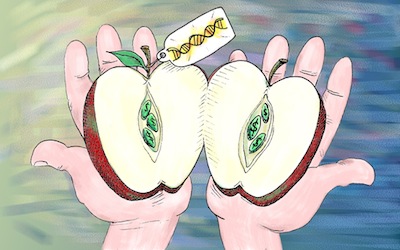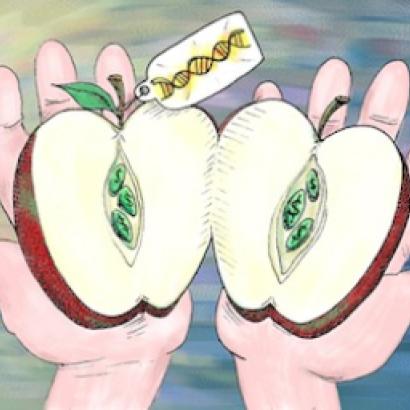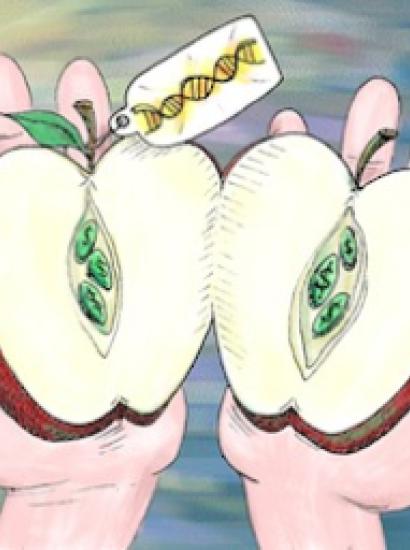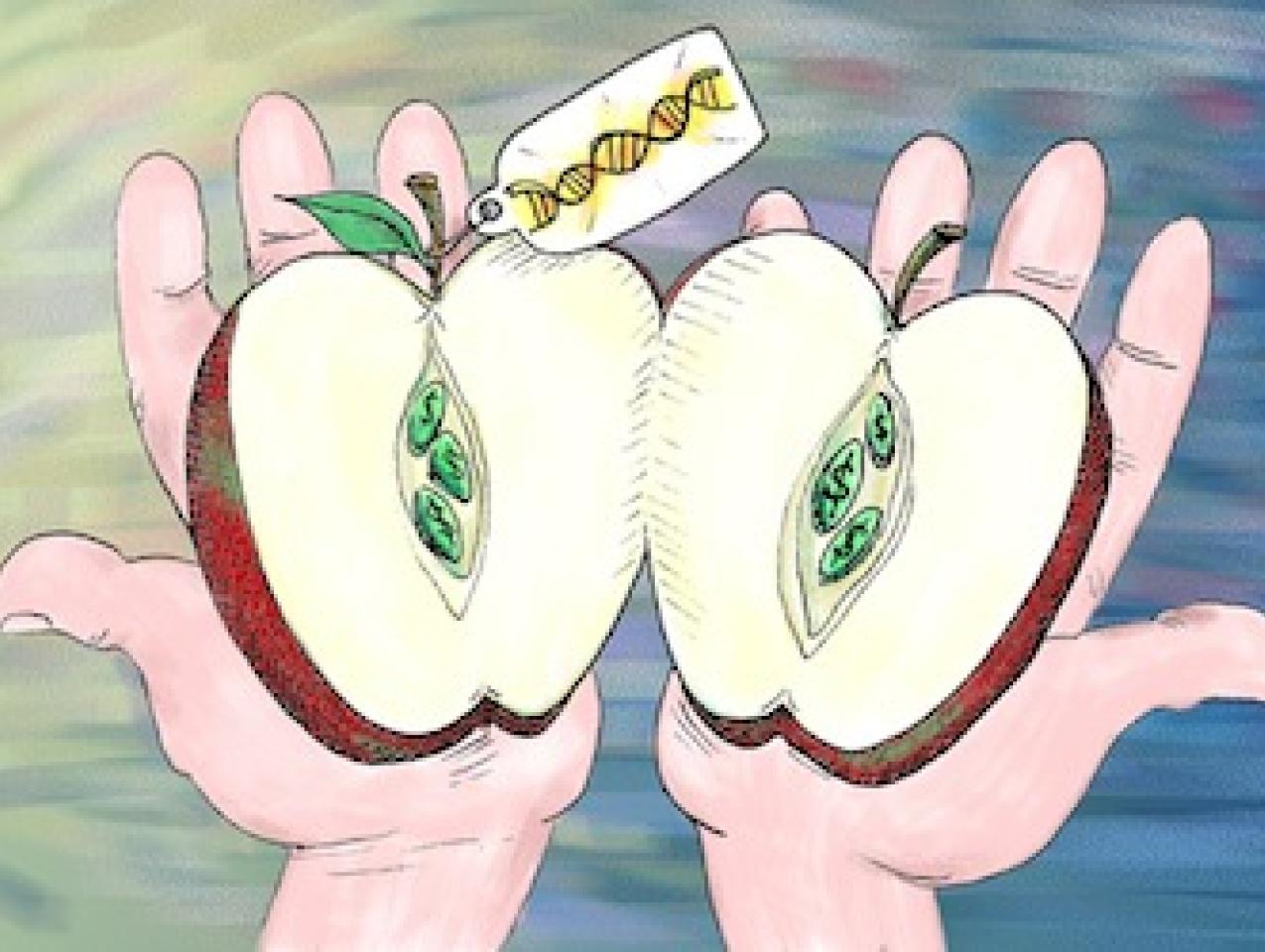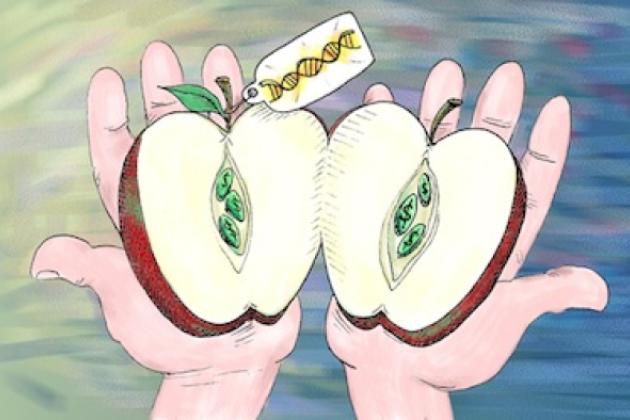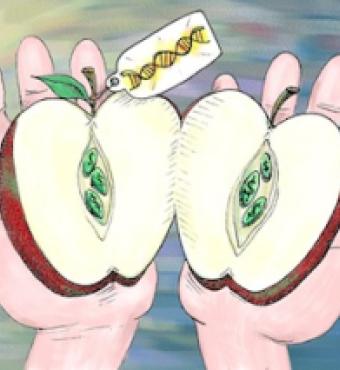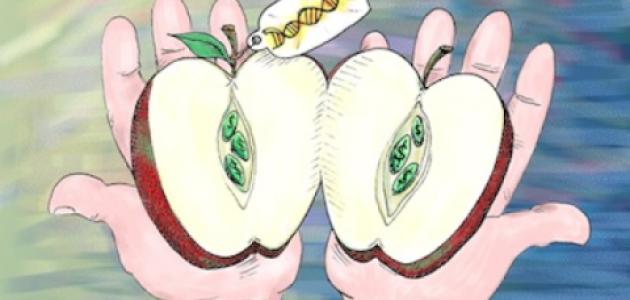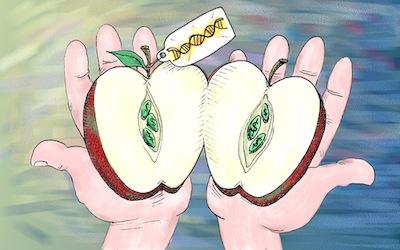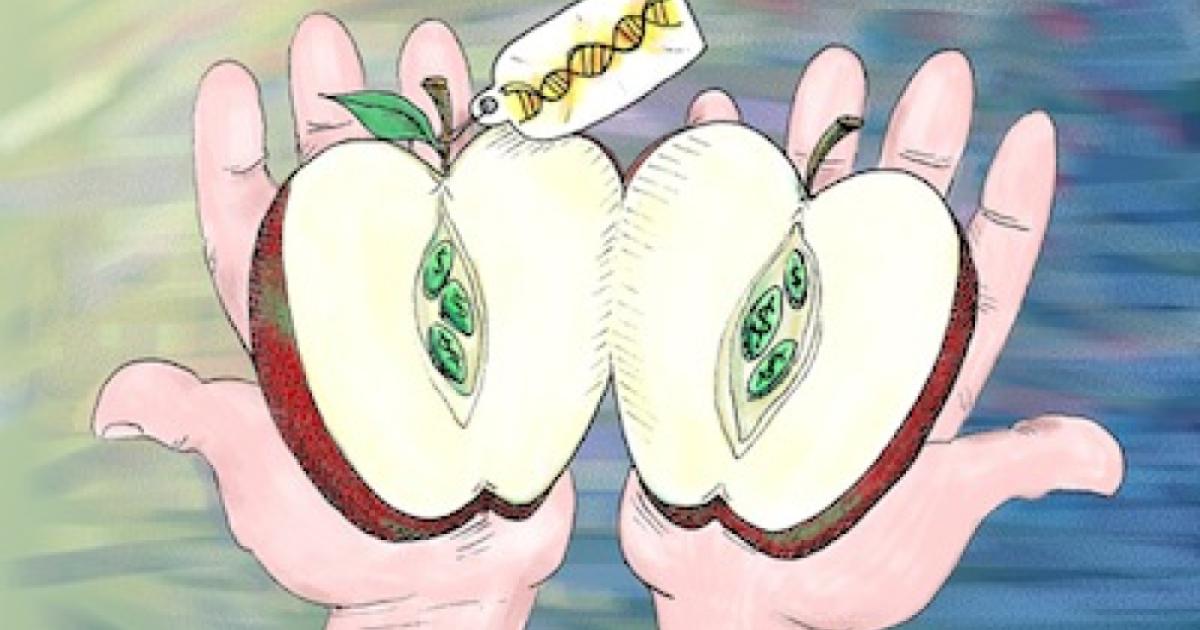- Health Care
A Canadian company has petitioned both U.S. and Canadian federal regulatory authorities to permit the marketing of a new apple variety called Arctic Apple that contains a commercially significant, consumer-oriented trait: It is highly resistant to the unappetizing browning that occurs when an apple is cut or bruised. The biology that made this possible is elegant and intriguing, but the public policy toward this innovative product may pose a problem.
Enzymatic browning is caused by the apple’s chemical reaction to cell injury, such as when the fruit is bitten or sliced, which ruptures the cells and triggers a chemical reaction between the enzyme polyphenol oxidase (PPO) and chemicals in the apple that cause the apple flesh to turn brown. A family of four genes controls the majority of PPO production, so scientists turned off those genes, and the resulting “Arctic Apple” variety doesn’t undergo enzymatic browning.
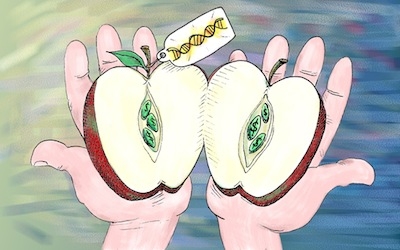
Illustration by Barbara Kelley
Ordinarily, this development of another new apple variety would be a non-event—except, perhaps, for apple growers and retailers who would relish a new product with additional appeal to consumers—but the seeds of discontent have been sown: Because the shutoff of the four genes was done with recombinant DNA technology (aka “genetic engineering” or “genetic modification” i.e. GM), the proposed commercialization of this new variety has been met with objections and consternation.
Simply because this highly precise and predictable technology was used, some apple growers are worried that this new variety could threaten other apple crops and their incomes.
The U.S. Apple Association (USApple), the industry’s trade group, says that it “supports advancements from technology and genetics and genomics research,” and that “benefits can include attributes such as quality,” which would certainly include non-browning apples. But, paradoxically, USApple has also come out firmly against the introduction of the Arctic Apple. USApple has emphasized that its objections are “not based on any concern about human health and safety,” but “consumers like their apples and are not calling for these new ‘non-browning’ cultivars.” How lame. Are consumers clamoring for apple cultivars that are more resistant to predation by insects, viruses, or fungi?
Unfounded Concerns
There are several reasons why their concerns are unfounded.
First, farmers and plant breeders have been creating new varieties of apples for millennia. The new molecular techniques for accomplishing this are far more precise, predictable, and conservative than older techniques for genetic improvement.
Second, the cultivation and consumption of recombinant DNA-modified varieties of various crops is commonplace. Farmers in three dozen countries have cumulatively cultivated more than 1.25 billion hectares (about 3.75 billion acres) of them, and North Americans alone have consumed more than 3 trillion servings of food or ingredients from these plants. There has never been a single documented case of disruption of an ecosystem or harm to a person.
Extensive global scientific research has identified no unique health risks associated with recombinant DNA-modifed crops or food, and the apple growers associations (except perhaps the organic growers) have no concerns about the safety of this non-browning apple.
Could the new apple “contaminate” other varieties? Research has shown that the cross-pollination potential of apples is limited to about 150 feet. Beyond that distance, cross-pollination of apples is virtually nil. The DNA in fruit comes from the parental tree, not the pollen that fertilizes the apple blossom. When someone eats a Golden Delicious apple, for example, 100 percent of the DNA (and protein, carbohydrates, and other compounds) is from Golden Delicious trees.
The entire apple industry owes the diversity of varieties to different gene expression patterns. A Golden Delicious apple looks and tastes different from a Red Delicious because different apple genes are expressed. Recent genomic sequencing shows there are about 57,000 genes in the Golden Delicious apple. One must look beyond the science to understand how the apple grower associations can be against two varieties of apples simply because four of the 57,000 apple genes have been down-regulated.
Short-Sighted Economics
The answer is short-sighted economics. A spokesperson for the Northwest Horticultural Council ascribed the apple industry’s opposition to the potential for “severe adverse marketing issues to confront both organic and traditional apple growers” if the Arctic Apple were to be introduced.
The organic fruit industry is especially antagonistic to the Arctic Apple (and to recombinant DNA technology generally). They claim that the organic status of their fruit is threatened by cross-pollination from any recombinant DNA-modified apple and are calling for a ban on all such varieties.
However, no organic grower has ever lost organic certification from exposure to trace amounts of recombinant DNA-modified seed or pollen. “Organic” status is conferred if the grower agrees to use only a restricted set of techniques and practices and is completely independent of the quality, safety, or characteristics of the product itself. In fact, the presence of recombinant DNA-modified plants and “prohibited” chemical pesticides is permissible under organic rules if the “contamination” was unintended.
Fear-mongering about recombinant DNA-modified crops has become the stock-in-trade of some anti-technology environmental organizations and the organic food industry. Thus, the possibility that their products will no longer be the “apple of the consumer’s eye,” as a result of negative propaganda from the organic food and anti-biotechnology organizations, concerns apple growers and their trade groups.
There are even more compelling reasons, other than pleasing their customers, for apple growers and their trade groups to embrace the new technology: The experiences, both positive and negative, of other farming sectors in the recent past.
Coffee & Wheat: Cautionary Tales
Consider, for example, the cautionary tale of the Kona coffee industry in Hawaii, which in 2008 pushed the Hawaii County Council to ban the growing of recombinant DNA-modified beans on the Big Island. The growers felt that the use of the new technology would damage Kona coffee’s brand. Beans developed using recombinant DNA technology cannot be classified as “specialty coffee,” and, therefore, it was feared, they would command a lower market price. (Recombinant DNA-modified coffee is also banned from key exports markets such as Japan.)
The industry may now be singing a different tune. Big Island coffee growers are facing a dire threat to their crops that didn’t exist four years ago: Infestations of the Coffee Berry Borer beetle, which has evolved resistance to pesticidal sprays, were first discovered in Kona in 2010, and have now been confirmed in all parts of west Hawaii and in some other areas as well. Faced with the threat of the devastation of their crops, the industry is now desperate for any measures to combat the beetle. Recombinant DNA technology has been widely and successfully used in corn, cotton, papaya and other crops to introduce resistance to pests.
Hawaiian coffee farmers and their organizations should have heeded the positive example of the Rainbow variety of papaya, Hawaii’s fifth-largest crop. By inserting a single gene from a virus into papayas (and into squash, sweet potatoes and other crops), scientists have made them virus-resistant. Although the biological mechanism is different, the effect is similar to the vaccination of people and animals using attenuated or killed viruses. The recombinant DNA-modified Rainbow papaya has resurrected Hawaii's $64 million-a-year industry, which 15 years ago had become threatened by the predations of papaya ringspot virus.
Wheat farming offers yet another example. By 2004, Monsanto had made substantial progress in the development of recombinant DNA-modified wheat varieties for North America. But suddenly, in that year, the company scrapped its wheat program in large part because of opposition from North American grain merchants and growers (which stemmed from concerns that some major foreign importers would reject imports of all American wheat because they could be "contaminated" with recombinant DNA-modified varieties). European countries and Japan, which have traditionally imported about 45 percent of U.S. wheat exports, have been resistant to recombinant DNA-modified crops and food derived from them.
However, American growers and millers have had a change of heart. Wheat farming is a struggling industry in the United States, in large part because it has not received the technological boost from recombinant DNA applications that have benefited the corn and soybean industries. U.S. wheat acreage is down about one-third from its peak in the early 1980s, due to its reduced profitability compared with alternative crops.
Therefore, in 2006, a coalition of U.S. wheat industry organizations called for access to recombinant DNA-modified wheat varieties with enhanced traits, and a survey released in February 2009 by the U.S. National Association of Wheat Growers found that more than three-quarters of American farmers wanted access to genetically improved varieties with resistance to pests, disease, drought, and frost.
Such varieties are important as plant scientists and farmers continue to battle diseases such as leaf rust, the world's most common wheat disease, which can lead to yield loss of up to 20 percent. In Kansas, the heart of the U.S. wheat belt, for example, leaf rust destroyed a shocking 14 percent of the wheat crop in 2007.
Before they opt to obstruct agricultural advances, apple growers should take note of the experience of other agricultural sectors. There is little doubt consumers will like and even pay a premium for the non-browning trait in apples. Instead of fighting the introduction of this improved, consumer-friendly product (as well as others that could follow), the apple growers’ associations should sow the seeds of greater sales and security of their harvests by mounting a truthful, positive ad campaign to trumpet these new advances in molecular biology. New and improved technologies, such as recombinant DNA technology, offer greater resilience to farmers; and in agriculture as in evolution, resilience favors survival.







